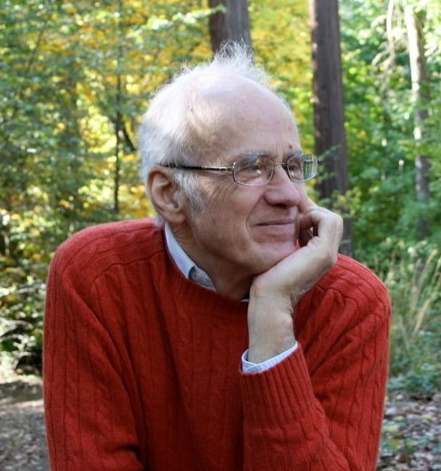Artists and communities are paying increasing attention to post-traumatic stress disorder. For example, my hometown has conducted a homecoming event for vets, including a workshop for a group of them, followed by a large public welcome, at which workshop participants read their poems. One speaker emptied his pack of many clattering containers of prescription meds and jokingly asked the shocked audience, "anybody want to party?" He then said he was taking the pills "for your protection." The whole process is shown in a superb documentary, "The Welcome," produced by Bill McMillan and Kim Shelton.
My town also has an annual "new plays festival." This year the first piece was called "Homecoming," by Michael Edan, a playwright from N.Y. state. He lets us listen to a disabled vet returning from Iraq and interacting with his wife, parents, and a long-time buddy. At night over a bottle of scotch, the son opens up and starts telling his dad, a Vietnam vet, what it was like in Iraq:
"This one time after shooting rockets into a building we were receiving heavy gun fire from, we stormed in. There's two teenage kids, a child and another guy, probably the father but it was hard to tell cause half his face was missing -- all dead. The woman bleeding from her head was screaming 'Why? Laish, laish.' I'm with the corpsman trying to help her while the rest of the marines are going thru the building; and something snapped. I felt like I was going nuts and just lost it, started to cry. The woman came up and touched my cheek. She kept saying 'Insha Allah, God's Will' -- cause the people there, it doesn't matter what s**t happens somehow they accept it as God's will. But it wasn't God's will, it was my f**king will. I gave the order that killed her family."According to the official Veterans Administration (VA) website, symptoms of PTSD can include "worry or anxiety, anger, sadness or hopelessness, sleep problems, trauma reminders, avoidance of stressful situations, disconnection from people, disconnection from reality...." Of course, as with every other psychiatric syndrome, some fraud occurs, but PTSD has become a major problem.
The true cost of war thus includes not only the sending of a military force, the building of bases, the bribery of foreign officials, the physical casualties on both sides, and the debt incurred, but also the care of vets when they return with such psychiatric troubles as PTSD. Often the damage lasts. One of the VA programs for vets returning from Iraq and Afghanistan (recent or current wars) also served vets from Vietnam, a war that ended in 1975, more than a third of a century ago, and began, for the U.S., in 1961, more than a half century ago.
PTSD affects both the vet and the family, friends, community, and co-workers (if he or she has found a job). Whether it is sleeping with a handgun under the pillow, suffering nightmares and anxiety attacks, or doing violence to the family or the self (22 returning vets commit suicide every day, according to a study covering 1999-2010). PTSD can ruin a family, a career, a life.
Artists are depicting the phenomenon of trauma in vets.. Along with the documentary "Coming Home," the gripping Edan play, and David Finkel's brilliantly reported book Thank You for Your Service, Steven Spielberg is working on a feature movie project on PTSD.
Meanwhile, the tendency to deny or push aside the true cost of things can be illustrated by an analogy. How much does gasoline cost? We can't drive by a filling station without seeing the current price on a large sign. But that price doesn't include the cost of military efforts to secure "access," or the health costs of pollution from vehicles, much less the slowly accumulating damage from greenhouse gases. It doesn't include what President Obama has called "wasteful subsidies" to the oil companies, or tax breaks.
Economists call hidden costs "externalities." It would be interesting to know how much of the "profit" in various enterprises comes from costs that are paid, eventually, by the public, or not paid fully at all except in the suffering of scattered private individuals.
PTSD is not adequately treated for at least two reasons: soldiers are often reluctant to accept help, and the dominant protocol for that help may not be the best we can do. Soldiers (or "warriors") are taught to be tough. Nothing is worse for a young male soldier than the "uss" words, to be called a "wuss" or a "p**sy." Suck it up and get well, what's the problem?
This attitude was memorably expressed by hard-right radio pesonality Michael Savage:
"if the whole nation is told, 'boo-hoo-hoo, come and get a medication, come and get treatment, talk about mental illness,' you know what you wind up with? You wind up with Obama in the White House and liars in every phase of the government.... A weak, sick, broken nation. And you need men like me to save the country. You need men to stand up and say stop crying like a baby over everything. Stand up already. Stop telling me how sick you are and sad you are. Talk about the good things in your life."
The dominant method of treatment for PTSD is called "habituation," which involves the vet describing the traumatic scene again and again. A soldier may start by resisting the prompt to revisit the traumatic event and end, in theory, being bored by his or her own account. That is the hope.
One project that is emphasizing good feeling as a basis for recalling is run by Michael Mithoefer, M.D., who uses the drug called MDMA as an adjunct to therapy. By itself, feeling love for a few hours might be transitory, but Mithoefer's finding is that effects of therapy done while the client is in this state can last.






